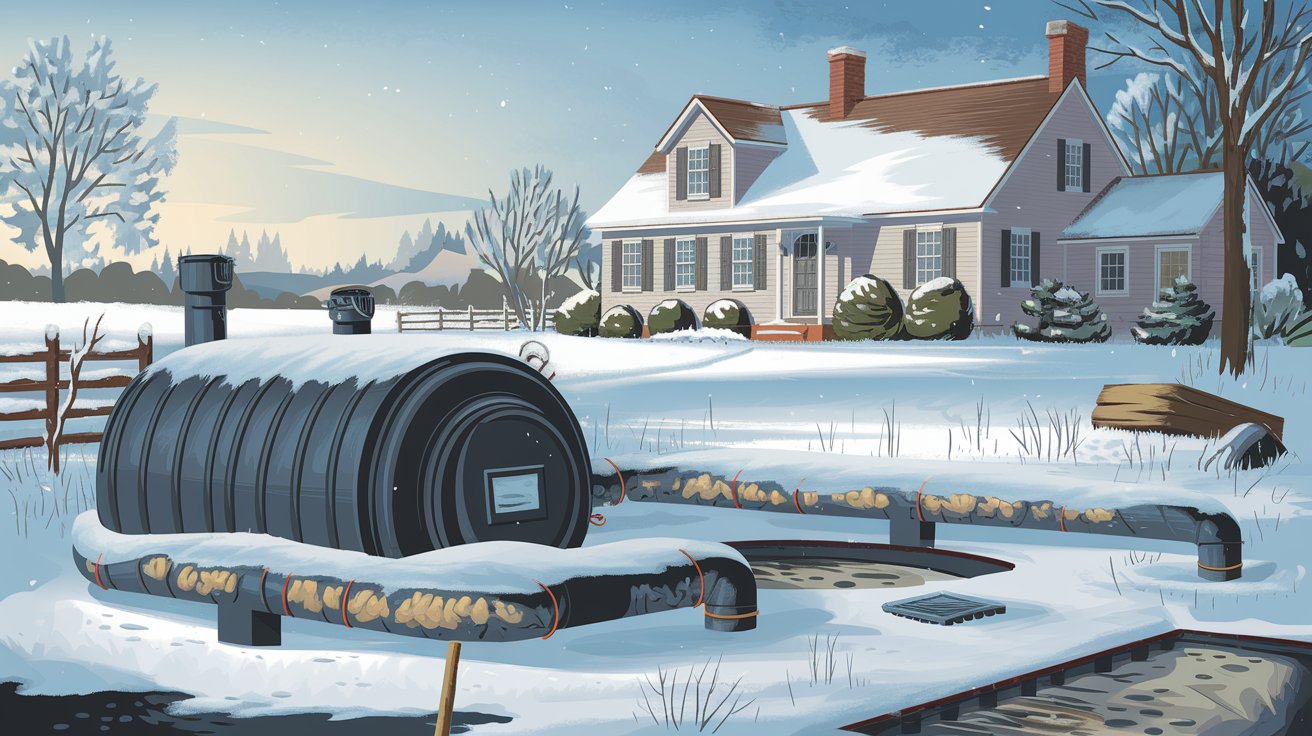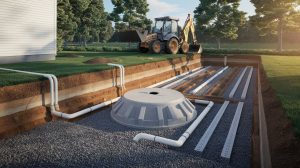When winter hits, we all know the importance of bundling up, keeping the car ready for snow, and ensuring the house is cozy. But have you ever stopped to think about your septic system? Just like everything else, it needs a little extra care during the colder months. Winter septic maintenance may not be the first thing that comes to mind, but trust us, it’s essential. Cold weather can do a number on your pipes and septic tank, causing frozen lines, backups, and even system failure if you’re not careful.
Table of Content
- How Cold Weather Impacts Septic Systems
- Why Regular Maintenance is Crucial Before Winter
- Best Practices for Winter Septic Maintenance
- What to Do if You Suspect a Winter Septic Issue
- FAQs about Winter Septic Maintenance
- Septifix
- Septic Permit Links by State
In this article, we’re going to walk you through why winter maintenance is so important for your septic system, how freezing temperatures impact it, and what you can do to keep everything running smoothly. By the end, you’ll know exactly how to prepare your system for the chill and avoid the headaches that come with a cold-weather disaster.
How Cold Weather Impacts Septic Systems
When the temperature drops, your septic system can face a whole new set of challenges. While we’re all worried about keeping our homes warm and cozy, your septic system needs some attention too. Here’s how the cold can affect your system:
Frozen Pipes and Tank Issues
We’ve all experienced the frustration of a frozen water pipe, but did you know your septic pipes can freeze too? When temperatures dip below freezing, the pipes leading to and from your septic tank can get blocked by ice. This means wastewater has nowhere to go, which can result in nasty backups and overflows. Plus, a frozen tank won’t allow waste to break down properly, which can throw your whole system off balance. To avoid this, insulation is key. Wrapping your pipes and ensuring the tank stays covered can make all the difference in preventing a chilly mess.
Decreased Bacteria Activity
Your septic tank is home to a busy colony of bacteria that break down waste and keep everything running smoothly. But just like us, these bacteria slow down when it’s cold. As temperatures drop, their activity decreases, which means waste isn’t broken down as efficiently. This can lead to clogs or backups, especially if the system isn’t properly maintained before winter. Keeping an eye on your tank and getting it pumped before the season starts can help ensure the bacteria have the best environment to do their job.
Soil Compaction
When the ground freezes around your septic tank and leach field, it becomes much harder for wastewater to flow through the soil. Normally, the soil absorbs and filters the water, but frozen ground can slow that process or even stop it entirely. This can result in slow drainage or water pooling around the system. A little preparation can go a long way, so make sure your system is ready to handle these freezing conditions.
Why Regular Maintenance is Crucial Before Winter
If you’ve ever had a plumbing emergency in the dead of winter, you know it’s not something you want to repeat. Luckily, a little bit of proactive maintenance can save you from the headache of dealing with a frozen or clogged septic system. Here’s why regular winter septic maintenance is a game-changer:
Pump Your Septic Tank
Before the first frost hits, it’s a smart idea to get your septic tank pumped. Over time, solids build up in the tank, and when it’s not pumped regularly, those solids can cause blockages. In the winter, if your tank is already overfilled, frozen pipes or a sluggish drain field can make things even worse. Pumping your tank ensures that everything has room to work properly. Plus, it gives the bacteria in the tank a better chance to do their job and break down waste efficiently.
Inspecting and Maintaining Pipes
Your septic system’s pipes are more vulnerable than you might think when the weather turns cold. Cracks, leaks, and signs of wear in your pipes can easily turn into bigger issues when the temperature drops. It’s a good idea to inspect your pipes before winter arrives, checking for anything that might cause a blockage or let in freezing air. Small repairs now can save you a lot of stress later on.
Clearing Snow and Ice from Key Areas
It might sound simple, but clearing snow around your septic tank and leach field is essential. Snow can trap moisture, and when the temperature drops, it can lead to frozen areas that prevent your system from working properly. By making sure these areas stay clear of snow and ice, you’re helping to keep the heat where it’s needed most and ensuring the system functions efficiently.
Best Practices for Winter Septic Maintenance
As winter sets in, you can’t always control the weather, but you can control how well you prepare your septic system. Let’s look at some easy and effective ways to keep things running smoothly when the temperature drops.
Insulating Pipes and Septic Tanks
Think of your septic system like any other part of your home that needs protection from the cold. Insulating your pipes and tank is one of the best ways to prevent freezing. Insulation helps keep the warmth in and the cold out, which reduces the risk of your pipes freezing up. You can use foam pipe insulation or even an insulated septic tank cover to provide extra protection. It’s an investment that pays off by preventing costly repairs.
Using Heat Tape for Cold Areas
In areas that are especially susceptible to freezing, like pipes running along exterior walls, heat tape can be a real lifesaver. This electrical tape is designed to heat the pipes and keep them warm enough to prevent freezing. It’s a simple, affordable solution that can make a big difference in ensuring your septic system works properly throughout the winter. Just make sure to follow the manufacturer’s instructions to ensure safe installation.
Monitor System Usage
During the winter, you may be tempted to use more water to stay comfortable, but it’s important to be mindful of your septic system’s load. Overloading your system with water can stress it out, especially when it’s cold outside. Try to space out water usage throughout the day, avoid running too many appliances at once, and fix any leaks as soon as they’re noticed. Keeping your water usage in check will help your system function more efficiently.
What to Do if You Suspect a Winter Septic Issue
Even with the best preparation, sometimes things don’t go as planned. If you suspect something is wrong with your septic system during the winter months, it’s important to act quickly. Here’s what you need to look out for and how to handle it.
Signs of a Frozen or Clogged System
If your septic system is having trouble during winter, there are a few key signs to watch for. First, you might notice slow drains or even standing water around your drains. Another red flag is a foul odor, which could indicate a backup in the system. If water starts backing up into sinks, tubs, or toilets, you’re likely dealing with a frozen or clogged pipe. In some cases, you may notice that areas around your septic tank or drain field are unusually wet or soggy, even when there hasn’t been any recent rain or snowmelt.
When to Call a Professional
If you’re seeing any of these signs, it’s better to be safe than sorry. It’s tempting to try and solve the problem yourself, but septic systems can be complicated, and winter issues, like frozen pipes or tank malfunctions, can require professional expertise. A licensed septic professional can quickly assess the situation, find the root of the problem, and fix it before it turns into a full-blown emergency. Don’t wait—call in the experts if you suspect something’s wrong.
Winter can be tough on your septic system, but with a little preparation and regular maintenance, you can avoid costly and stressful issues. By insulating pipes, pumping your septic tank, and staying mindful of your system’s needs, you can ensure it runs smoothly all season long. Don’t wait until you’re dealing with a backup or frozen pipes—taking simple steps now can save you from a headache later.
Need help with septic tank maintenance? Check out our product reviews and expert tips to keep your system in top shape all year round!
FAQs about Winter Septic Maintenance
Why is winter septic maintenance important?
Winter septic maintenance is crucial because freezing temperatures can cause pipes to freeze, slow down bacterial activity in the tank, and lead to clogs or backups. Proper maintenance ensures your septic system continues to function properly, preventing costly repairs during the cold months.
How can I tell if my septic system is frozen?
Signs of a frozen septic system include slow-draining sinks or toilets, foul odors, and standing water around the septic tank or drain field. If you notice any of these symptoms, it’s best to call a professional to inspect the system.
How do I prevent my septic pipes from freezing?
To prevent your septic pipes from freezing, insulate them with foam or fiberglass insulation. You can also use heat tape on vulnerable pipes to keep them warm. Additionally, make sure your septic tank is well-insulated to help protect the system from freezing.
Should I pump my septic tank before winter?
Yes, it’s a good idea to pump your septic tank before winter. Pumping removes accumulated solids, reducing the risk of clogs and backups during cold weather. It also ensures that the bacteria in the tank have enough room to break down waste efficiently.
Can snow and ice around the septic tank cause problems?
Yes, snow and ice around your septic tank can block airflow and prevent heat from escaping, leading to frozen pipes. It’s important to clear snow and ice from the tank and drain field areas to ensure the system functions properly.
When should I call a professional for septic issues in winter?
If you notice signs of a frozen or malfunctioning septic system, such as slow drains, foul odors, or water backing up, it’s time to call a professional. A licensed septic expert can quickly diagnose and resolve the issue before it leads to bigger problems.
DIY Septic Tank Installation: A Complete Guide for Homeowners
Directory | Washington Septic Service Providers | Part 2
Directory | Washington Septic Service Providers | Part 1
DIY Repairs Are Always Cheaper
Septic Regulations in Rural Areas: Essential Guide for Rural Property Owners
The Role of Perforated Pipes in Drain Fields
What Happens During a Pumping Service?
Septic Tanks vs. Sewer Systems | Choosing the Right Option
Septifix











